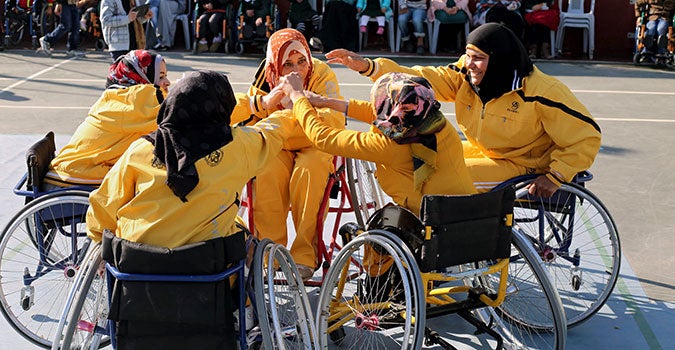
Palestinian girls take part in the Wheelchair Basketball Championship in Gaza in December 2015. Photo by Samar Abu Al-Ouf.
It is estimated that one in five women lives with a disability [1]Women with disabilities have different types of impairments, including physical, psychosocial, intellectual and sensory conditions, with or without functional limitations. Furthermore, the diversity of women with disabilities includes women with multiple and intersecting identities in all contexts, including ethnic, religious and racial backgrounds, refugee, migrant, asylum seeker and internally displaced status, LGBTIQ+ identity, age, marital status and living with or affected by HIV.
As a result of their disparate life experiences based on these factors, women and girls with disabilities are often marginalized and experience severe discrimination, which can lead to reduced economic and social status, increased risk of violence and abuse, including sexual violence, gender-based discriminatory practices, and limited access to education, health care (including sexual and reproductive health), information, services, justice, as well as civic and political participation.
These barriers hinder full and effective participation across the humanitarian-development continuum, including during the pandemic and in post-conflict and transitional situations.
Women’s and disability rights organizations work to ensure their full participation in society on an equal basis with others, but gaps in coordination and lack of access to funding mean that their needs are often overlooked in the development and implementation of policies, programs and intergovernmental processes.
Our Solutions
Recognizing that a gender-neutral approach to disability inclusion perpetuates discrimination and vulnerability, UN Women has made concerted efforts to advance disability inclusion and gender equality, including through building and strengthening partnerships and contributing to amplifying the voices of women and girls with disabilities. The active participation and consultation of women with disabilities and their representative organizations has advanced gender equality and disability inclusion efforts at all levels. In 2017, to strengthen the institutionalization of its work in this area, UN Women established a Global Task Team on Disability and Inclusion and a Disability Inclusion Community of Practice to support the development and implementation of UN Women’s corporate strategy on this issue.
To guarantee women with disabilities a voice and equal representation, UN Women strives to ensure women’s active participation in intergovernmental meetings and consultative processes. UN Women is involved in multi-agency and multi-stakeholder mechanisms to promote inclusion of the rights of women and girls with disabilities and contributes to the development of policies and accountability frameworks on disability inclusion across the UN system.
UN Women is leading a multi-agency joint programme on COVID-19 response, including on intersectionality, anti-discrimination and disability. These efforts are supporting, among other things, UN country teams on the ground.
story
More Stories ►
Publication
Other publications ►

